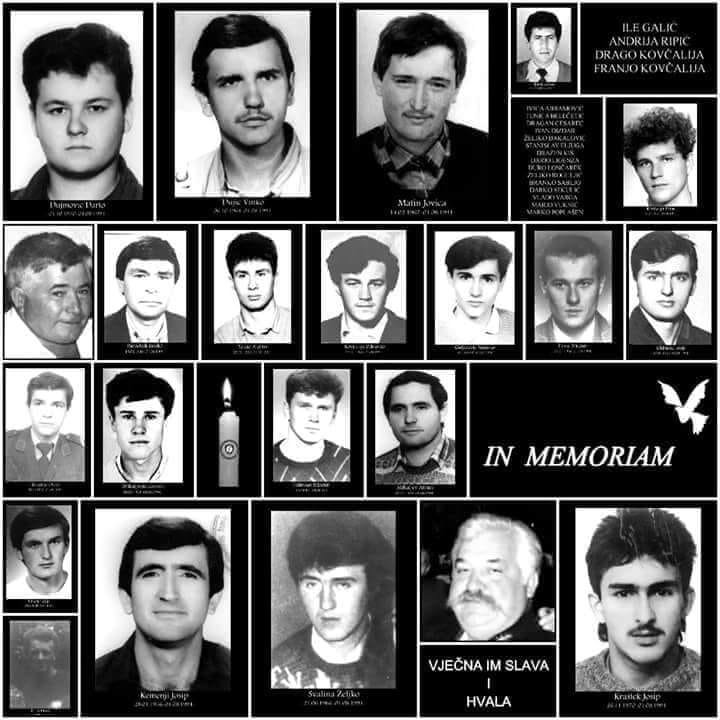After being surrounded by Serbian irregular forces in late July of 1991, the villages of Dalj, Aljmaš and Erdut in the easternmost part of Croatia were occupied on August 1, 1991.
A heavy artillery barrage on Dalj and Erdut began at approximately 3:30 AM and was followed by a combined attack, from several directions, of armored mechanized infantry forces that originated from Serbia. Serb rebels backed by the Yugoslav People’s Army (YPA) also attacked the police station in Dalj.

While Croatian soldiers heroically resisted the brutal attack and suffered great losses, the civilian population retreated towards the Danube River where at around 10:00 AM they boarded the first of many barges to flee the area. Seven years of exile awaited them. Žarko Kaić captured shocking footage of distraught seniors, women and children leaving their homes in tears. The images circulated throughout the world as besieged Croatia appealed to the world for assistance.
Following an almost ten-hour siege of the Dalj police station by tanks and infantry, Serbian rebels occupied the building and immediately executed the remaining survivors. These included 20 policemen, 15 National Guardsmen and four members of the local Civil Defence Unit whose names are eternally bound to the establishment of the Republic of Croatia – Josip Glibušić, Slavko Putnik, Đuro Butorac, Vinko Dujić, Stanislav Guljašević, Mijo Džanko, Josip Kraštek, Antun Mihaljev, Boško Paradžik, Petar Kovčalija, Josip Kemenji, Mladen Palinkaš, Željko Svalina, Stjepan Pavić, Jovica Matin, Ivan Horvat, Dario Dujmović, Goran Mihaljević, Zdravko Kovčalija, Zlatko Takač, Ivica Abramović, Tunica Belečetić, Dragan Cesarec, Ivan Dizdar, Željko Đakalović, Stanislav Eljuga, Dražen Kiš, Dario Ligenza, Đuro Lončarek, Željko Roguljić, Branko Sabljo, Darko Sekulić, Vlado Varga, Mario Vuknić, Marko Poplašen, Andrija Ripić, Ile Galić, Drago Kovčalija and Franjo Kovčalija.

The Croats who remained in their homes suffered suffered harassment, rape and murder. There was also a camp in Dalj where innocent men, women and children were cruelly tortured on a daily basis. Marijan Gubina, who was imprisoned in the camp as a ten-year-old recalled the hellish experience in his book 260 Days.
On the day that Dalj, Aljmaš and Erdut were occupied, Croatian State Radio in Osijek broadcasted the song “Ne dirajte mi ravnicu” (“Don’t Touch My Plain”) by Miroslav Škoro. Interestingly the song had originated in the United States and had nothing to do with the war. It collected dust in the audio library of Osijek Radio until August 1, 1991 when after a report on the persecuted residents of Aljmaš (who repeatedly vowed to return to their homes) program producer Željko Barba remembered one of the song’s lines “I will return” and played it for the first time. The song later become ingrained in Croatian popular culture as an anthem for all those forced from their homes as a result of Serbian aggression during the Homeland War.
Magistar sam povijesti. Radno iskustvo stjecao sam u Hrvatskom povijesnom muzeju i na Hrvatskoj radioteleviziji u emisiji TV Kalendar. Autor sam nekoliko knjiga i filmova na temu Domovinskog rata. Osnovao sam i uređujem Facebook stranicu Dogodilo se na današnji dan – Domovinski rat i portal Domovinskirat.hr. Također uređujem i vodim emisiju Domoljubne minute koja se svakog dana emitira na Hrvatskom katoličkom radiju te emisiju Sve za Hrvatsku i Novi valovi dobrote. Vlasnik sam obrta CroHis kojim promičem vrijednosti Domovinskog rata.

